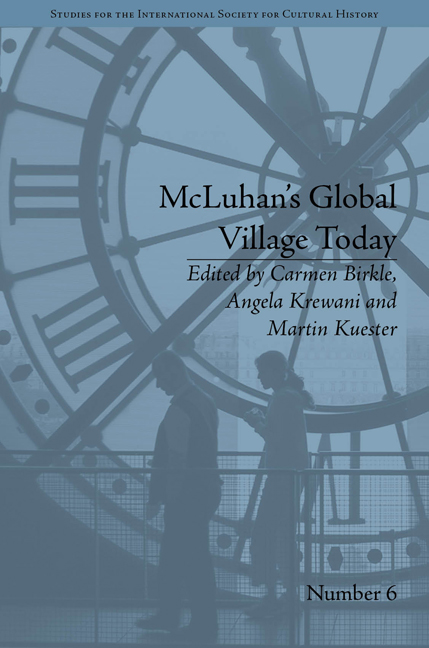Book contents
- Frontmatter
- CONTENTS
- List of Contributors
- List of Figures
- McLuhan's Global Village Today: An Introduction
- Part I McLuhan and Media Theory
- Part II McLuhan and Literature
- Part III McLuhan and Technical Media
- 11 Radio Voices: Reflections on McLuhan's Tribal Drum
- 12 McLuhan's Paradigms and Schafer's ‘Soundscape’: Parallels, Influences, Envelopes, Shifts
- 13 Literary Modernists, Canadian Moviegoers and the New Yorker Lobby: Reframing McLuhan in Annie Hall
- 14 The Animated Medium is the Animated Message (?): Reading Animated Moving Pictures with Marshall McLuhan
- 15 Marshall McLuhan and the Emergence of American Television Theory
- 16 ‘The Medium in Your Pocket’: A McLuhanian Approach to New Media
- Notes
- Index
13 - Literary Modernists, Canadian Moviegoers and the New Yorker Lobby: Reframing McLuhan in Annie Hall
from Part III - McLuhan and Technical Media
- Frontmatter
- CONTENTS
- List of Contributors
- List of Figures
- McLuhan's Global Village Today: An Introduction
- Part I McLuhan and Media Theory
- Part II McLuhan and Literature
- Part III McLuhan and Technical Media
- 11 Radio Voices: Reflections on McLuhan's Tribal Drum
- 12 McLuhan's Paradigms and Schafer's ‘Soundscape’: Parallels, Influences, Envelopes, Shifts
- 13 Literary Modernists, Canadian Moviegoers and the New Yorker Lobby: Reframing McLuhan in Annie Hall
- 14 The Animated Medium is the Animated Message (?): Reading Animated Moving Pictures with Marshall McLuhan
- 15 Marshall McLuhan and the Emergence of American Television Theory
- 16 ‘The Medium in Your Pocket’: A McLuhanian Approach to New Media
- Notes
- Index
Summary
Like all signs, what going to the movies communicates, what it means or can mean for those who practice it and through their social and interpretive competencies encode and decode it, is fundamentally subject to multi-accentuality, the property by which a sign carries the potential to signify multiple, even contradictory, meanings contingent on the conditions of its use.
McLuhan as Performance: Canadian Perspectives
McLuhan – Canada's pre-eminent media-theory explorer, raising and addressing historical and contemporary issues of and relationships among media and technology, society and culture – approached his material and his audience not only as a professor of English literature but also as a modernist literary artist/performer. In the opening sections of this essay I want to acknowledge him in this latter role, and link him to other literary modernists of his generation active in Canada: poet/ playwright and English professor Wilfred Watson, novelist and English professor Sheila Watson, novelist Malcolm Lowry, poet and English professor Earle Birney, poet Dorothy Livesay and a couple of other writers and a painter, Jack Shadbolt.
I also want to note that McLuhan drew on the performance practices – and, let me say at once, the media analyses – of such high modernists who preceded him as James Joyce and Wyndham Lewis. Janine Marchessault calls him a modernist performer in the avant-garde style of Joyce; Donald Theall calls him a prose poet and social satirist in the manner of Lewis.
- Type
- Chapter
- Information
- McLuhan's Global Village TodayTransatlantic Perspectives, pp. 145 - 168Publisher: Pickering & ChattoFirst published in: 2014



